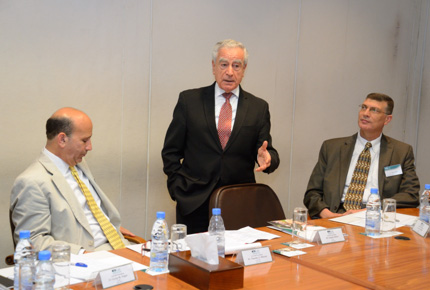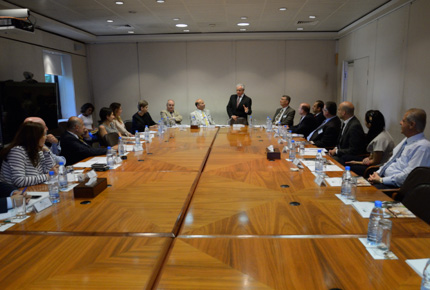A union of best practices
LAU hosts a workshop by the Association to Advance Collegiate Schools of Business (AACSB).

According to Meston, the region is in need of an affinity group to discuss its particular challenges.

AACSB offers its members an extensive global database that covers information and reports on business schools around the world.
LAU has once again been the welcoming host to a workshop organized by the Association to Advance Collegiate Schools of Business (AACSB), which provides first-class accreditation to business schools worldwide. The deans of some of the main business schools in Lebanon and the Middle East took part in the event to discuss a common strategy to advance the quality of their academic offerings.
Timothy Mescon, who volunteered with AACSB for 25 years before becoming Senior Vice President and Chief Officer of the agency for the EMEAregion, travelled all the way from Amsterdam to brief his audience on effective academic advancement strategies. What the MENA needs, according to Mescon, is “an affinity group that will gather at our conferences and discuss the issues relevant to the region.”
By hosting the event for the third time, LAU has shown its dedication to facilitating this process. “We are committed to sharing everything with you,” said President Joseph G. Jabbra, referring to both the institution’s facilities and expertise. “This is a matter of regional interest and the advancement of business education is part of our mission,” he added.
LAU’s Adnan Kassar School of Business is at an advance stage in the process of acquiring AACSB accreditation. Since filing its application in 2012, LAU’s business school has been working hard to excel at AACSB’s three accreditation pillars; engagement, innovation and impact.
LAU Provost George K. Najjar, who is also Middle East and Africa advisor to the CEO, reminded the community that “the end game is not receiving the accreditation, but the cultural change that this journey entails.” He added, “The process itself confronts the institution with a moment of truth about the way it is presenting itself, what it is offering and how its graduates differ from others.”
AACSB offers its members an extensive global database that covers information and reports on business schools around the world. Together with the monthly publication BizEd, the portal gives member institutions a way to engage with international trends in management education.
“Just imagine all these deans sitting at the same table and the amount of experience they can share,” said workshop participant Karim J. Nasr, dean of the Faculty of Business and Management at the University of Balamand. “I applaud LAU for hosting such gathering, which is an occasion to network, brainstorm and share our knowledge.”
Karim Seghir, dean of the School of Business at the American University of Cairo, shares Nasr’s sentiments. “Knowing that other deans are facing the same challenges is a form of psychological support,” he ironized, adding that his previous participations had led to new partnerships. “We serve the region better if we are together,” he concluded.
A MENA affinity group is, to use Najjar’s words, a “strategic imperative.” Mescon plans to return to the region for a new workshop in early fall this year. “It is important that we visit the countries where our institutions are,” he said, underlining AACSB’s desire to better understand the challenges that local academic institutions are facing. The previous meeting in Amsterdam had resulted in the formation of a MENA advisory board. Now, the time is ripe to explore and establish new common best practices that will boost the quality of management education in the region.
More
Latest Stories
- A Cardiovascular Conference to Streamline National Expertise
- Aspiring Engineers Compete for Scholarships at LAU
- The School of Engineering Delivers Immersive Learning Experiences
- Consultants in the Making
- LAU Marks Rare Disease Day With a Call for Collaboration
- First Pulsed-Field Ablation in Lebanon Takes Place at the LAU Medical Center
- LAU New York Becomes a Degree-Granting Campus
- Health Science Students Win at the Annual Colorectal Awareness Walkathon

